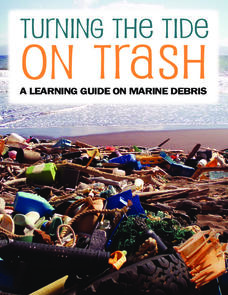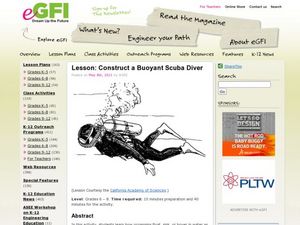Curated OER
National Marine Sanctuaries Fish
Information is provided on Gray's Reef, Florida Keys, and Flower Garden Banks marine sanctuaries. Young marine biologists then visit the FishBase and REEF databases to collect fish species information for each location. They then...
NOAA
Turning the Tide on Trash: A Learning Guide on Marine Debris
The lessons in this learning guide are designed to increase youngsters' awareness of the impacts of marine debris and to teach them about pollution prevention techniques. This fabulous, 30-page packet is chock full of important...
Curated OER
Turning the Tide on Trash: Marine Debris Curriculum
Seven pages of fascinating reading on marine debris preface the activities in this lesson plan. Four different activities are employed to simulate how the debris is distributed in the ocean and along beaches. Early ecology learners...
Curated OER
Turning the Tide on Trash: Marine Debris Curriculum
Six different lessons comprise this unit on marine debris. Science, language arts, social studies, and art projects make this an ideal interdisciplinary unit. The result will be well-informed future citizens who can help make a...
Curated OER
Marine Debris
Now is the time to educate tomorrow's citizens to care for the planet, and here is a instructional activity to help facilitate the process. Collect some marine debris and bring it into class. Have your class separate it into types and...
Curated OER
What's in That Cake?
Cooperative groups research trip logs from deep-sea expeditions and explore characteristics of deepwater habitats. Using a cake as the ocean floor, they work together to decorate it as a model of such habitats. They also prepare a...
NOAA
Understanding Food Chains and Food Webs
Jump into an exploration of marine ecosystems with the first lesson in this four-part series. After first learning about crustaceans, mollusks, and other forms of sea life, young marine biologists view a PowerPoint presentation that...
NOAA
What Little Herc Saw
See the underwater world through a different pair of eyes! Middle school marine biologists identify deep-sea organisms by examining images taken by an ROV from the Okeanos Explorer. After determining what creatures lie beneath the...
Curated OER
Coral Snapshots
Using photographs and a coral reef identification key, junior marine biologists compare changes in coral cover for a No-Take Area and the surrounding unprotected area. The data that is collected is then analyzed for richness,...
Kenan Fellows
The Effects of Environmental Conditions on Aquatic Organisms
What kind of experiment can your class do to how observe the environment effects on organisms? Groups design and conduct lab experiments to learn about the effects of the environment on aquatic organisms. Based upon knowledge gained from...
Howard Hughes Medical Institute
Ocean Acidification
Human impacts on the environment can sometimes be difficult to measure, especially under water! An activity centered on ocean acidification gives science scholars the opportunity to examine the effects of carbon dioxide on marine life....
NOAA
An Ocean of Energy
Young biologists trace the path of the sun's energy through marine ecosystems in the second part of this four-lesson series. Building on prior knowledge about producers, consumers, and decomposers young scholars are introduced to the...
NOAA
Seafood and Human Health
Whether your young biologists realize it or not, humans play a significant role in marine ecosystems. To help them understand this fact children first create graphical representations that show homo sapiens' place in marine food chains,...
Curated OER
Marine Energy
In small groups, energy engineers research and make a topographic map of a marine natural resource. They report to the rest of the class pros and cons of extracting their assigned resource. The two activities may take up to four class...
Nature Works Everywhere
Sharks and Shorelines
Examine predator-prey marine relationships through an interactive lesson design. Learners begin by studying a specific shark species and then analyze real-time shark-tracking data. They also study threats to shark populations and...
Curated OER
Classifying Deep-Sea Organisms
Young scientists access the EARTH Web site in order to engage in this lesson plan life forms found in the ocean. Student groups of 3 - 4 choose one set of deep-sea organism images. The groups decide how they would classify their...
NOAA
Watch the Screen!
Can a sponge cure cancer? Life science pupils visit the drugstore under the sea in the fifth activity of six. Working groups research the topic then get hands-on experience by testing the inhibiting effects of several plant extracts on...
Science Matters
Blubber Gloves: It’s All About Insulation
Instill the concept of adaptation with the help of Blubber Gloves—ziplock bags, shortening, and duct tape. Scholars discuss how animals and plants keep warm in polar regions, record their predictions, and try on their Blubber Gloves to...
Curated OER
Ecosystems
A critical look into the structure and function of ecosystems is here for young learners as a series of lessons and worksheet activities. Topics covered include land-based and marine ecosystems, connections to the water cycle, food webs,...
Curated OER
Whale Song Acrostic
What do whales sing about? Invite your class to imagine the thoughts of whales before writing acrostic poems on the topic. The plan blends together a bit of life science with plenty of opportunities for creativity and writing.
Sea World
Ocean Discovery
Immerse your young marine biologists in the world of marine animals. The lesson includes several activities that are age-appropriate for preschoolers and kindergartners, including coloring pages, gluing feathers and sand onto paper...
Curated OER
My Wet Robot
After hearing about the 2006 PHAEDRA mission that explored the Aegean Sea, middle schoolers work in groups to create a robotic vehicle. They must consider power, propulsion, and other vital systems. Use the multitude of external...
Wilderness Classroom
Ocean Life
Our oceans are composed of many complex relationships. Young oceanographers explore relationships between organisms, understand the world ocean's currents, and discover the effects of water pollution and how it behaves. There are three...
Curated OER
Construct a Buoyant Scuba Diver
Groups of young oceanographers get to use action figures to experiment with the property of buoyancy! This memorable lesson plan provides detailed background information, a link to the laboratory worksheet, and thorough instruction...

























